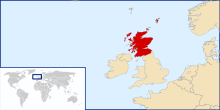ܣܟܘܛܝܐ
Appearance
Assyrian Neo-Aramaic
[edit]

Etymology 1
[edit]Learned borrowing from Latin Scotia.
Pronunciation
[edit]Proper noun
[edit]ܣܟܘܿܛܝܼܵܐ • (skōṭīyā) f
- Scotland (a constituent country of the United Kingdom)
Etymology 2
[edit]From the above + -ܝܐ (-āyā, the attributive adjective ending).
Pronunciation
[edit]Adjective
[edit]ܣܟܘܿܛܵܝܵܐ • (skōṭāyā) (feminine ܣܟܘܿܛܵܝܬܵܐ (skōṭāytā), plural ܣܟܘܿܛܵܝܹ̈ܐ (skōṭāyē))
- Scottish (of, from, or pertaining to Scotland, the Scottish culture, the Scottish people, or the Scottish language)
Noun
[edit]ܣܟܘܿܛܵܝܵܐ • (skōṭāyā) m (plural ܣܟܘܿܛܵܝܹ̈ܐ (skōṭāyē), feminine ܣܟܘܿܛܵܝܬܵܐ (skōṭāytā))
- Scot (A person from Scotland or of Scottish descent)
Inflection
[edit]| isolated forms | with possessive pronouns | |||||||
|---|---|---|---|---|---|---|---|---|
| state | form | person | singular | plural | ||||
| m | f | |||||||
| singular | absolute | – | 1st person | ܣܟܘܿܛܵܝܝܼ (skōṭāyī) | ܣܟܘܿܛܵܝܲܢ (skōṭāyan) | |||
| construct | ܣܟܘܿܛܵܝ (skōṭāy) | 2nd person | ܣܟܘܿܛܵܝܘܼܟ݂ (skōṭāyūḵ) | ܣܟܘܿܛܵܝܵܟ݂ܝ (skōṭāyāḵ) | ܣܟܘܿܛܵܝܵܘܟ݂ܘܿܢ (skōṭāyāwḵōn) | |||
| emphatic | ܣܟܘܿܛܵܝܵܐ (skōṭāyā) | 3rd person | ܣܟܘܿܛܵܝܹܗ (skōṭāyēh) | ܣܟܘܿܛܵܝܵܗ̇ (skōṭāyāh) | ܣܟܘܿܛܵܝܗܘܿܢ (skōṭāyhōn) | |||
| plural | absolute | – | 1st person | ܣܟܘܿܛܵܝܝܼ̈ (skōṭāyī) | ܣܟܘܿܛܵܝܲܢ̈ (skōṭāyan) | |||
| construct | ܣܟܘܿܛܵܝܲܝ̈ (skōṭāyay) | 2nd person | ܣܟܘܿܛܵܝܘܼ̈ܟ݂ (skōṭāyūḵ) | ܣܟܘܿܛܵܝܵܟ݂ܝ̈ (skōṭāyāḵ) | ܣܟܘܿܛܵܝܵܘ̈ܟ݂ܘܿܢ (skōṭāyāwḵōn) | |||
| emphatic | ܣܟܘܿܛܵܝܹ̈ܐ (skōṭāyē) | 3rd person | ܣܟܘܿܛܵܝܘܼ̈ܗܝ (skōṭāyūh) | ܣܟܘܿܛܵܝ̈ܘܿܗ̇ (skōṭāyōh) | ܣܟܘܿܛܵܝܗ̈ܘܿܢ (skōṭāyhōn) | |||
Derived terms
[edit]- ܣܟܘܿܛܵܐܝܼܬ݂ (skōṭāˀīṯ, “Scottish language”)
Categories:
- Assyrian Neo-Aramaic terms borrowed from Latin
- Assyrian Neo-Aramaic learned borrowings from Latin
- Assyrian Neo-Aramaic terms derived from Latin
- Assyrian Neo-Aramaic terms with IPA pronunciation
- Assyrian Neo-Aramaic lemmas
- Assyrian Neo-Aramaic proper nouns
- Assyrian Neo-Aramaic feminine nouns
- aii:Scotland
- aii:Constituent countries of the United Kingdom
- aii:Places in the United Kingdom
- Assyrian Neo-Aramaic adjectives
- Assyrian Neo-Aramaic nouns
- Assyrian Neo-Aramaic masculine nouns
- aii:Nationalities
